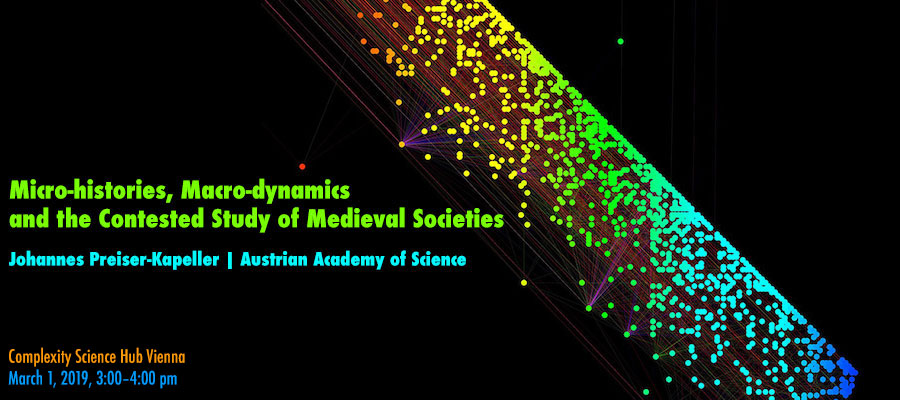Micro-histories, Macro-dynamics and the Contested Study of Medieval Societies, lecture by Johannes Preiser-Kapeller (Austrian Academy of Science), Complexity Science Hub Vienna, March 1, 2019, 3:00–4:00 pm
The human past has become a contested and almost congested testing ground for complex theory building and mathematical modelling. The resulting hunger for quantifiable or even “big” data often clashes with the traditional virtues of historical hermeneutics such as close reading, source criticism and context-analysis. Thus, despite some promising interdisciplinary undertakings, findings from such attempts of “historical complexity research” still tend to be rejected or even ignored within the wider community of historians.
Based on his own work with tools of historical network, quantitative and environmental historical research and contributions to large scale projects such as the “Seshat Global History Databank” (directed by CSH External Faculty member Peter Turchin) and the “Climate Change and History Research Initiative” (at Princeton), Johannes will discuss the potentials and problems of the “concubinage” of complexity research and historical studies. In particular, he will demonstrate his current comparative research on the dynamics and social cohesion of medieval societies during periods of severe crisis, especially the Byzantine Empire and other polities during the 7th-9th, 11th and 14th century CE.
Johannes Preiser-Kapeller is team leader of the research group “Byzantium and beyond“ and of the research area “Complexities and Networks” at the Division for Byzantine Research of the Institute for Medieval Research at the Austrian Academy of Sciences as well as lecturer at the University of Vienna. His research interests include historical complexity and network research as well as the global and environmental history of the Middle Ages.
RSVP required.
